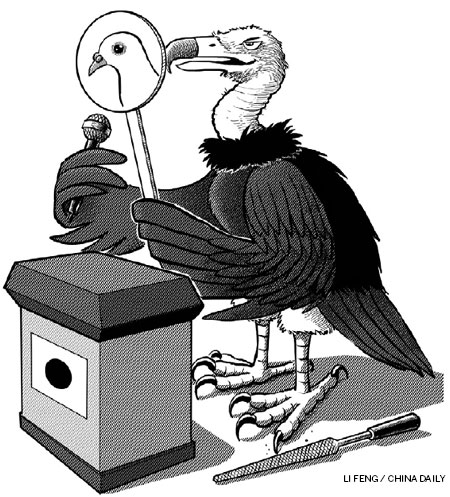Sino-Japan ties not easy to improve
Updated: 2013-02-05 07:46
By Zhou Yongsheng (China Daily)
|
||||||||

Japanese Prime Minister Shinzo Abe reiterated on Feb 1 that Japan-China relations remain one of the most important bilateral relations for Japan and should be improved overall.
Before that, some Japanese public figures and senior officials of Japan's ruling party, including former Japanese prime ministers Yukio Hatoyama and Tomiichi Murayama, have visited China separately over the past weeks, raising hopes of a thaw in Sino-Japanese relations. The visit of Abe's special envoy Yamaguchi Natsuo's to Beijing has added to that hope.
But the sharp differences between the two countries cannot be resolved simply through the wishes of Japanese politicians and public figures. What Japanese politicians need to do now is to translate their wishes into concrete actions to break the deadlock of their own making.
Japan broke the agreement of "shelving disputes" to work for the future reached by former Chinese premier Zhou Enlai and former Japanese prime minister Kakuei Tanaka. Japan even accuses China of forging this agreement and refuses to acknowledge its existence.
Despite China's fierce opposition to the illegality and invalidity of Japan's unilateral actions on the Diaoyu Islands, Japan went ahead with its plan to "purchase " the islands, and tried to eliminate all obstacles to "private ownership" and ultimately "nationalization " of the islands to reinforce its control over them.
Although China has asked Japan to at least accept the existence of a dispute over the islands, Japan has firmly denied that there is one. Instead, it has overacted to China's rightful actions to defend its sovereignty.
The Abe government has drafted its road map to improve Sino-Japan relations before resolving the Diaoyu Islands dispute. Abe has indicated that China should stop making a "fuss" over the Diaoyu Islands and that Japan will adopt an even tougher policy toward them. He wants China to acknowledge or give tacit consent to Japan's policy and not to break off relations with Japan just because of the Diaoyu Islands dispute. He has also said that he believes China and Japan can deepen economic and trade cooperation despite the islands issue.
Moreover, there are enough indications that the Abe government will seek to amend Japan's constitution to upgrade the country's Self-Defense Forces to a full-fledged military and "realize its right to self-defense".
A possible amendment to Japan's constitution seems irrelevant to the Diaoyu Islands issue. But in reality it is related to peace and stability in the entire Asia-Pacific region. The Abe government will "realize Japans' self-defense rights" by altering the Defense Guideline, under which it can add new articles to the constitution. Abe has vowed to reinforce the military capability of Japan, especially in the southwestern islands, which is believed to be targeted at China.
Japan's current "pacifist constitution" is the fruit of the international community's war against Fascism, which represents the desire of the people across the world for peace and to prevent Japan from rebuilding its military for fear that it would start another devastating war. In this sense, Japans' current constitution is a sort of guarantee for peace and stability in Asia-Pacific.
If the United States supports Japan to amend its constitution and become a military power, it risks being dealt another deadly blow by a belligerent Japan. The US experience this time might not be different from what it was during World War II.
The Abe government divides its policy toward China into two directions. On one hand, it cites the "China threat" theory to develop militarily. On the other, since China is an important trade partner of Japan, it realizes the need to strengthen economic ties with China, especially because it is still battling recession.
But China does not split politics from economics when it comes to Japan. China sincerely hopes to deepen and upgrade economic cooperation with Japan, but it cannot sacrifice its sovereignty for economic gains.
China's top political leader Xi Jinping's recent emphasis on adherence to the "Peaceful Development Road", should be interpreted by Japan as a sign of China according priority to dialogue and diplomacy to resolve disputes with its neighbors. However, Japan should not forget that the Chinese leadership has also emphasized that China's core national interests are not tradable.
China looks forward to seeing Japan take concrete actions to defuse the tensions over the Diaoyu Islands dispute. Only when Japan starts to match its words with actions can China make a conciliatory move. But if Japan only uses rhetoric to repair Sino-Japanese ties, nothing much will come out of it.
The author is a professor of Japan Studies at China Foreign Affairs University.
(China Daily 02/05/2013 page9)

 Li Na on Time cover, makes influential 100 list
Li Na on Time cover, makes influential 100 list
 FBI releases photos of 2 Boston bombings suspects
FBI releases photos of 2 Boston bombings suspects
 World's wackiest hairstyles
World's wackiest hairstyles
 Sandstorms strike Northwest China
Sandstorms strike Northwest China
 Never-seen photos of Madonna on display
Never-seen photos of Madonna on display
 H7N9 outbreak linked to waterfowl migration
H7N9 outbreak linked to waterfowl migration
 Dozens feared dead in Texas plant blast
Dozens feared dead in Texas plant blast
 Venezuelan court rules out manual votes counting
Venezuelan court rules out manual votes counting
Most Viewed
Editor's Picks

|

|

|

|

|

|
Today's Top News
Boston bombing suspect reported cornered on boat
7.0-magnitude quake hits Sichuan
Cross-talk artist helps to spread the word
'Green' awareness levels drop in Beijing
Palace Museum spruces up
First couple on Time's list of most influential
H7N9 flu transmission studied
Trading channels 'need to broaden'
US Weekly

|

|







